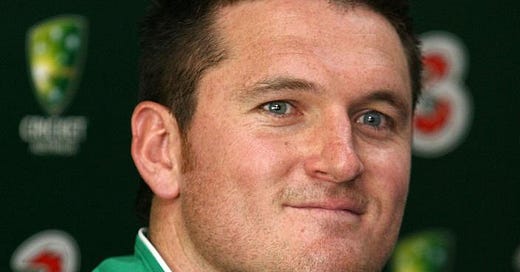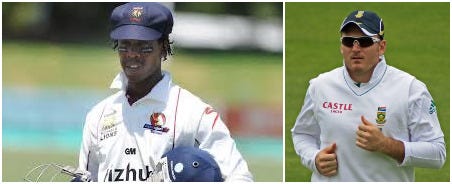A week before South Africa’s enthralling and spicy tussle with Bangladesh at Kingsmead another, a different engagement was taking place involving two former South African captains and a big-hitting legal team. Really big-hitting.
The two men disagreed on a point of fact which was important enough to potentially affect the rest of their lives and, unable to resolve it, they had ended up here. Neither was prepared for what happened next which was a cross-examination as forensic in detail and severity as any criminal matter.
Both men were shocked by the relentlessness and personal nature of the questioning. Perhaps they were naieve, or simply hadn’t applied their mind to the nature of the proceedings. Certainly, neither of them expected to be made to feel like criminals. Their knowledge of the law, and how truth is determined in a ‘court’ setting, was limited – to say the least.
Graeme Smith was facing three ‘charges’ of racism or racial prejudice, one during his decade-long term as national captain and the other two during his short-term as Director-of-Cricket which came to an end on March 31. One of the charges was that he allegedly said he would not serve under a black Chief Executive. Given that he had just spent 15 months working under Pholetsi Moseki in that position, the charge was barely even addressed during the hearing.
The second was that he had appointed Mark Boucher as Proteas head coach ahead of Enock Nkwe on the basis of racial bias. Whatever the rights and wrongs of Boucher’s qualifications and suitability for the position, Smith did not appoint him. The majority-black CSA Board sanctioned his appointment. And Smith had been actively pursued by the soon-to-be discredited CEO, Thabang Moroe, to accept the DoC position. He was encouraged to make decisions in the best interests of SA cricket.
It was argued that, given the desperation of the situation, with England due to arrive in the country for a full tour less than two weeks later and the Proteas still without a coach, the Board would have appointed anybody Smith recommended. But was that Smith’s fault? He suggested a man he was familiar with and who had been successful at domestic level winning five trophies with the Titans. Boucher has the minimum coaching qualifications, Nkwe has the maximum – Level Four. Boucher was always likely to arouse controversy. But if Smith was biased, was it on the basis of race? This charge, apparently, received more time than the first, but not by much.
The vast majority of the time was spent on the allegation by Smith’s captain in the under-19 team of 2004, Thami Tsolekile, that he was excluded from selection to the Test squad for the 2012 tour of England because of his race. Smith refutes the accusation in the strongest possible terms and was required to do so repeatedly when questioned by counsel.
An affidavit was provided by the then selection convenor and current CSA board member, Andrew Hudson, that it was he who had made the decision to use the designated reserve wicket keeper, AB de Villiers, when Boucher’s career was ended by a freak eye injury – and that it was he who had given Tsolekile encouragement that a return to the Test side was close.
Smith and Tsolekile remembered things very differently. It was the job of Advocates Hamilton Maenetje and Michael Bishop to pick through their memories in graphic, forensic and, at times, unpleasantly personal detail. If shock tactics were required to unveil the truth, they would be used. And they were. It was the reason the hearing was held behind closed doors.
The results are due to be made public, in a presumably and suitably sanitised and redacted form, around April 22. I’m reliably informed that a month is a spectacularly short turn-around in the legal world for a case such as this.
It is worth remembering that the ‘charges’ against Smith resulted from Ombudsman Dumisa Ntsebesa’s final report from the Social Justice and Nation Building Hearings - and that he qualified them as ‘tentative’. A series of well-intentioned ‘Truth and Reconciliation’ styled hearings which cost over R7million, in which testimony was given and accusations made without cross-examination, have resulted in another set of hearings, and more costs.
Smith, understandably, opted not to re-apply for the DoC job and will soon be heard commentating during the IPL. Apparently, however, a small but clear majority of CSA’s board does recognise and appreciate the respect and influence he commands globally, and that one of his final deals in the job was to negotiate a series of lucrative tours by India which will keep the game alive in this country for a few more years.
Smith needs his name to be cleared if he is ever to work for CSA again and the right people at CSA know only too well that they need him, and will so so even more in the future. Whether the former captain has the desire and trust to do so again is questionable.
Hopefully, a way will also be found, somehow, for Tsolekile not to be the outcast he is now. Although that will be extremely difficult given his 12-year ban from any official aspect of the game following his implication in the RamSlam match-fixing scandal of 2016.
The Smith-Tsolekile situation is a mess but it might be remembered as a harmless fairytale if Boucher’s hearing, with more accusations and greater vitriol, goes ahead in the middle of May. Boucher’s hearing could involve most of the national squad, including both captains, Dean Elgar and Temba Bavuma – though indications at this stage are that both sides are reluctant to call witnesses and will keep them to a minimum if unavoidable.
Boucher has the backing of bottomless funds from billionaires who believe he has been wronged. If the shit-fight takes place, they will win. Money always does. It’s everyone else who will lose.
There must be a better way. There has been too much destruction already.





The Hearings are corporate/management irony at its absolute worst. An activity that was intended to provide justice, to build and unite, has brought nothing but injustice, destruction and further division.
A complex situation! Thanks for the clarification Manners, well done with great insight , well written as usual.